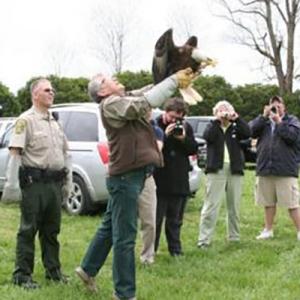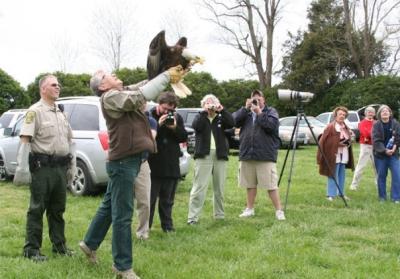
“Teaching the world to care about, and care for, wildlife and the environment” is not only the mission statement of the Wildlife Center of Virginia, but a concise summary of the Rare Life of Center co-founder and President, Ed Clark. Throughout his life, he has been committed to protecting wild places and wild things, and to helping others form meaningful relationships with the natural world around them. According to Clark, “When I was nine years old, I stood on the sidewalk on a blustery day in Washington, DC and heard the newly-inaugurated President of the United States, John F. Kennedy, say that we should ‘Ask not what your country can do for you. Ask what you can do for your country.’ I was sure he was speaking to me, personally; I have tried to live up to that admonition ever since.” The world-renowned Wildlife Center of Virginia is certainly the most tangible manifestation of Clark’s commitment and capabilities. Started in an empty barn in 1982, to care for local wildlife, the Center has now grown into one of the world’s leading teaching and research hospitals for wildlife and conservation medicine. In addition to having cared for sixty thousand injured and orphaned wild animals, and having reached millions of people with its educational programs, the state-of-the-art Wildlife Center trains veterinary students and professionals from every vet school in the US and Canada and from 42 other countries. Through the clinical care of their patients, Clark and his colleagues identify and confront environmental threats facing all wildlife, and indeed entire ecosystems—problems ranging from emerging viral diseases to environmental contamination from pesticides and oil spills. The importance and implications of these environmental insights has grown in recent years as it has become clear that wildlife may be the first indicators of bio-security threats that could affect both people and animals. For Clark and his team, wildlife truly is “the canary in the coalmine”, often the first to be affected by environmental issues--including bioterrorism. Recognizing that wildlife care facilities like the Wildlife Center of Virginia may be the first to recognize such threats, Clark and his team have spent more than seven years developing and deploying a sophisticated, online database, called WILD-ONe, which links care centers across North America, and helps them collect, compile, and analyze their patient records to detect and report even subtle health issues, as they emerge. In addition to cutting edge work on wildlife and environmental health, Clark leads his team in connecting people and nature, and helping other organizations become more effective in the cause of conservation. Clark is a popular inspirational and motivation speaker, and has become the “go to” guy for non-profit conservation and animal welfare organizations worldwide, when they need management advice and assistance. Having held volunteer leadership positions with more than two dozen state, national, and international conservation and environmental organizations and agencies, Clark’s love of the nature has made a difference worldwide. Tens of thousands of injured wild animals have been helped directly, by Clark and his team; and perhaps millions more, indirectly, though his work with other organizations. His leadership has helped protect hundreds of thousands of acres of public and private land from development, and strengthened many environmental laws and regulations. Perhaps most importantly, throughout his Rare Life, Clark has inspired and enabled countless others to get involved with the protection of their own wild places, and the conservation of the wild things they love…building a better future, and a better world, for generations yet unborn.



